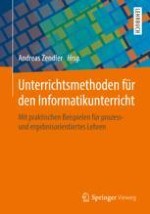2018 | OriginalPaper | Buchkapitel
6. Lerneffektivität ausgewählter Methoden
verfasst von : Andreas Zendler, The Instructional Method Group
Erschienen in: Unterrichtsmethoden für den Informatikunterricht
Verlag: Springer Fachmedien Wiesbaden
Aktivieren Sie unsere intelligente Suche, um passende Fachinhalte oder Patente zu finden.
Wählen Sie Textabschnitte aus um mit Künstlicher Intelligenz passenden Patente zu finden. powered by
Markieren Sie Textabschnitte, um KI-gestützt weitere passende Inhalte zu finden. powered by
